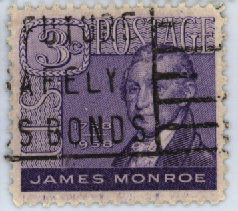 In
1817, James Madison
was succeeded in the Presidency by
James Monroe.
The distinguishing event of the new administration was the enunciation of
the socalled Monroe Doctrine.
In
1817, James Madison
was succeeded in the Presidency by
James Monroe.
The distinguishing event of the new administration was the enunciation of
the socalled Monroe Doctrine.
< Previous Page * Next Page >
Slavery, which had up to now received little public attention, suddenly assumed enormous importance - "like a fire bell in the night," in Jefferson's words. In the early years of the republic, when the northern states were providing for immediate or gradual emancipation of the slaves, many leaders had supposed that slavery would die out. In 1786, Washington wrote that he devoutly wished some plan might be adopted "by which slavery may be abolished by slow, sure, and imperceptible degrees." Jefferson, Madison, Monroe, and other leading southern statesmen made similar statements. As late as 1808, when the slave trade was abolished, there were many southerners who thought that slavery would soon end.
The expectation proved false, for during the next generation, the south became solidly united behind the institution of slavery as new economic factors made slavery far more profitable than it had been before 1790.
Chief among these was the rise of a great cotton-growing industry in the south, stimulated by the introduction of new types of cotton and by Eli Whitney's invention, the cotton gin, for separating the seeds from cotton. At the same time, the Industrial Revolution, which made textile manufacturing a large-scale operation, vastly increased the demand for raw cotton. And the opening of new lands in the west after 1812 greatly extended the area available for cotton cultivation. Cotton culture moved rapidly from the tidewater states through much of the lower south to the Mississippi River and eventually on to Texas.
Sugar growing also expanded and extended slavery. The rich, hot lands of southeastern Louisiana had proved ideal for growing profitable sugar-cane crops. By 1830, the state was supplying the nation with about half its sugar supply. Finally, tobacco growing moved westward, taking slavery with it.
As the free society of the north and the slave society of the south spread westward, it seemed politically expedient to maintain a rough equality between the new states then being established. In 1818, when Illinois was admitted to the Union, 10 states permitted slavery and 11 free states prohibited it, but balance was restored after Alabama was admitted as a slave state.
When northerners rallied to oppose the entry of Missouri except as a free state, a storm of protest swept the country. For a time, Congress was at a deadlock. Under the leadership of Henry Clay , a compromise was arranged: Missouri was admitted as a slave state, but at the same time Maine came in as a free state. Congress also decreed that slavery should be forever excluded from the territory acquired by the Louisiana Purchase north of Missouri's southern boundary.
Except for a migration into Texas beyond the bounds of the United States, the westward march of the agricultural frontier did not pass Missouri until after 1840. In the meantime, the far west had become a field of great activity in the fur trade, which was to have significance far beyond the value of the skins. As in the first days of French exploration in the Mississippi Valley - indeed as in the first steps the English and Dutch took westward from the Atlantic coast - the trader was pathfinder for the settlers. The French and Scotch-Irish trappers, exploring the great rivers and their tributaries and discovering all the passes of the Rockies and the Sierra Mountains, made possible the overland migration of the 1840's and the later occupation of the interior. And in 1819, in return for assuming the claims of American citizens to the amount of $5 million, the United States obtained from Spain both Florida and Spain's rights to the Oregon country in the far west.
 In
1817, James Madison
was succeeded in the Presidency by
James Monroe.
The distinguishing event of the new administration was the enunciation of
the socalled Monroe Doctrine.
In
1817, James Madison
was succeeded in the Presidency by
James Monroe.
The distinguishing event of the new administration was the enunciation of
the socalled Monroe Doctrine.
The basic elements of the doctrine, taken separately, were all well-recognized American principles. Washington, Jefferson, and Madison had all advised against involvement in permanent or "entangling" alliances abroad. Jefferson had proclaimed the paramount interest of the United States in the fate of neighboring territories when he protested against the transfer of Louisiana by Spain to any power other than the United States. And the principle of self-determination had been expressed by the people of the United States in their sympathy for the inhabitants of the Spanish-American colonies then struggling for independence.
< Previous Page * Next Page >